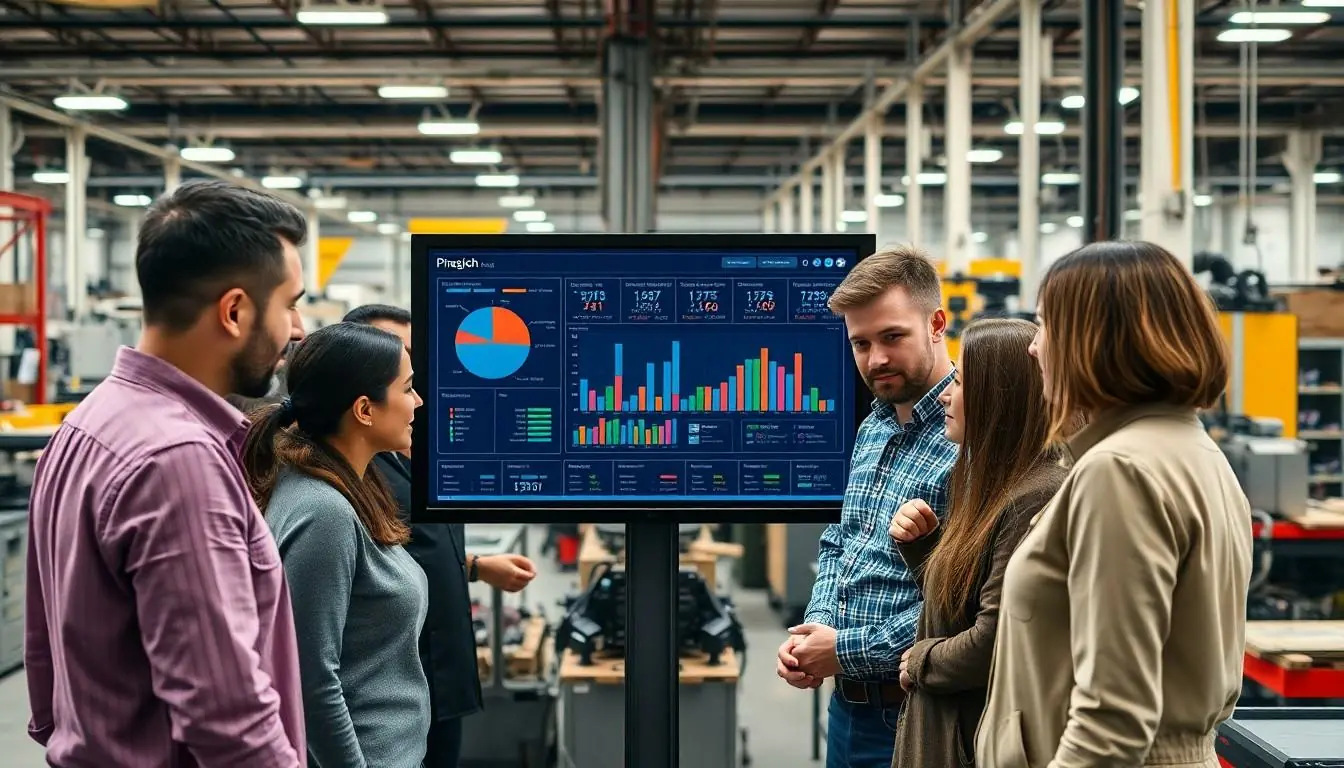Table of Contents
ToggleIn the fast-paced world of manufacturing, juggling spreadsheets and sticky notes is so last decade. Enter manufacturing enterprise resource planning (ERP) software—the superhero your production line didn’t know it needed. With its ability to streamline processes, manage resources, and keep everything running smoother than a well-oiled machine, ERP software is transforming the industry one factory at a time.
Overview of Manufacturing Enterprise Resource Planning Software
Manufacturing enterprise resource planning software integrates various functions within manufacturing operations. It streamlines processes such as inventory management, production planning, and order tracking. Companies gain efficiency by centralizing data, which allows for real-time decision-making.
Modular design in ERP systems facilitates customization based on specific industry needs. Manufacturing firms select modules that fit their unique requirements, covering everything from supply chain management to quality control. Vendors offer various solutions, ensuring businesses can tailor software to their operational demands.
Collaboration improves significantly with ERP software. Departments can share information easily, reducing silos that slow down processes. When teams access the same data, they respond quickly to changes and improve coordination.
Cost savings arise through better resource management. By minimizing waste and optimizing inventory levels, companies reduce holding costs. This directly impacts the bottom line by enhancing profitability.
Manufacturing ERP software also supports compliance. Through features that monitor regulatory requirements, companies maintain standards in reporting and documentation. Staying compliant with industry regulations protects businesses from potential penalties.
User-friendly interfaces enhance usability for employees. Intuitive design encourages adoption across organizations, ensuring teams utilize the software effectively. Training programs often accompany the implementation of ERP systems, easing the learning curve.
As technology evolves, manufacturers increasingly rely on cloud-based ERP systems. Cloud solutions offer scalability and flexibility, accommodating growth without significant upfront investment. Businesses benefit from automatic updates and reduced IT maintenance, keeping systems current with minimal effort.
The integration of analytics within ERP software provides deeper insights. Companies analyze data trends, aiding better forecasting and strategic planning. With enhanced visibility, manufacturers remain agile in a dynamic marketplace.
Key Features of Manufacturing ERP Software

Manufacturing ERP software includes multiple essential features that enhance operations within the industry. These features streamline processes and promote efficiency across various departments.
Inventory Management
Effective inventory management remains a critical component of manufacturing ERP software. Real-time tracking of inventory levels enables organizations to minimize stockouts and overstock situations. Automated reordering processes further ensure that materials arrive just in time, improving workflow efficiency. Integration with suppliers allows for seamless communication regarding replenishment needs, which optimizes supply chain performance. Companies benefit from accurate demand forecasting, making it easier to align inventory levels with production schedules.
Production Planning
Production planning within ERP software streamlines scheduling and resource allocation. Detailed insights into production capabilities allow manufacturers to allocate resources more effectively, leading to better utilization of machinery and labor. Flexible scheduling features adapt to changing demand, accommodating last-minute adjustments. The software enables cross-department collaboration, ensuring that all teams remain informed about production timelines and expectations. By maintaining an organized workflow, companies can enhance overall productivity and reduce lead times.
Financial Management
Comprehensive financial management forms another vital aspect of manufacturing ERP software. It consolidates financial data across departments, facilitating accurate reports and analyses. Real-time monitoring of budgets and expenses helps organizations identify variances, allowing for prompt decision-making. Automated invoicing and payment processing reduce administrative burdens, improving cash flow management. Integrating financial analytics empowers manufacturers with insights into profitability and cost reduction strategies, enhancing overall financial health.
Benefits of Using Manufacturing ERP Software
Manufacturing ERP software offers a range of benefits that enhance operational effectiveness across various functions in the industry.
Improved Efficiency
Efficiency increases significantly with the implementation of ERP software. Processes become streamlined, as all functions integrate seamlessly. By automating routine tasks, production lines become more agile and less prone to errors. Manufacturing entities can manage resources effortlessly while minimizing any disruptions. The optimization of workflows reduces lead times considerably, allowing companies to deliver products to customers faster. Managers benefit from improved scheduling capabilities, which lead to better resource allocation throughout the production cycle.
Enhanced Collaboration
Collaboration among teams improves dramatically with ERP systems in place. Information silos dissolve as data becomes accessible across departments. Employees can share insights in real time, fostering a culture of teamwork. Production planning aligns more closely with inventory management, which leads to smarter decision-making. When departments communicate effectively, organizations experience fewer misunderstandings and more coherent strategies. Each team can contribute valuable input, driving innovation and enhancing overall project outcomes.
Real-Time Data Access
Access to real-time data transforms decision-making processes. Manufacturing ERP systems aggregate data from various sources into a centralized platform. This immediacy allows stakeholders to monitor performance and identify issues without delay. As a result, companies can respond quickly to market changes or production challenges. With dashboards and analytics tools readily available, manufacturers can visualize trends and forecasts. Such insights empower informed strategic planning, enabling organizations to stay competitive in a rapidly evolving marketplace.
Challenges in Implementing ERP Software
Implementing manufacturing ERP software presents several challenges that companies must navigate. First, data migration often proves cumbersome; transferring historical data from old systems to the new ERP platform requires careful planning to avoid loss and inaccuracies.
Resistance to change frequently emerges as a significant barrier. Employees accustomed to traditional methods may hesitate to embrace new processes, resulting in a slow transition. Training and change management play critical roles in overcoming such resistance, yet these initiatives can demand substantial time and resources.
Integration with existing systems also poses challenges. Legacy systems may not easily connect with modern ERP applications, leading to potential disruptions. Compatibility issues require careful assessment and may necessitate additional investments in middleware or custom solutions.
Customization varies from company to company. While ERP systems offer modular designs, tailoring the software to address specific business needs often leads to complexities. Each customization request must be evaluated for feasibility and impact on overall functionality.
Costs associated with ERP implementation often exceed initial estimates. Budget overruns can arise from unforeseen expenses, including software customizations, hardware upgrades, and ongoing maintenance. Assessing total cost of ownership is vital for accurate budgeting.
Lastly, selecting the right ERP provider becomes crucial. Vendors with extensive industry expertise often take priority, yet evaluating their support and service levels is essential. A well-selected partner can ease implementation challenges and provide ongoing assistance.
Manufacturers must strategically address these challenges to maximize the benefits of ERP software. Careful planning and thoughtful execution lead to successful implementation, empowering organizations to achieve their operational goals.
Future Trends in Manufacturing ERP Software
Artificial intelligence enhances manufacturing ERP software, driving smarter automation and data analysis. Increased adoption of machine learning algorithms will provide insights into operational efficiencies and help predict maintenance needs. Cloud-based solutions gain popularity due to their scalability, enabling manufacturers to adapt quickly to changing market demands.
Sustainability considerations become central in ERP development, leading to functionalities that support green manufacturing practices. Integrating Internet of Things (IoT) devices with ERP systems enables real-time data collection, offering better visibility across production lines. Enhanced cybersecurity features are essential, as the reliance on digital tools increases.
Mobile accessibility allows managers and employees to access critical information on the go, improving responsiveness and decision-making. Customizable dashboards provide tailored analytics, empowering users to visualize key performance indicators that matter most to them. Integration with e-commerce platforms is expected, facilitating smoother order processing and customer relationship management.
Configurability advances, allowing manufacturers to tailor ERP systems to specific workflows without extensive coding or IT intervention. Predictive analytics becomes a key feature, allowing businesses to anticipate trends and demands more effectively. The integration of smart robotics within ERP platforms will further enhance operational efficiency and reduce labor costs.
Continuous improvement mechanisms will emerge, enabling manufacturers to innovate processes continuously. Emphasizing user experience ensures that newer interfaces remain intuitive, reducing training time and boosting engagement. As ERP software evolves, the focus shifts toward leveraging data for better strategic planning and long-term competitiveness in the manufacturing industry.
Manufacturing ERP software is revolutionizing the industry by enhancing efficiency and fostering collaboration. As companies embrace this technology, they’re not just streamlining operations but also positioning themselves for future growth. The integration of advanced features like AI and IoT provides manufacturers with the tools needed to adapt to market changes swiftly.
While challenges in implementation exist, the long-term benefits far outweigh the initial hurdles. By choosing the right ERP provider and focusing on user experience, manufacturers can unlock significant value. As the landscape continues to evolve, those who invest in robust ERP solutions will likely lead the way in innovation and competitiveness.




